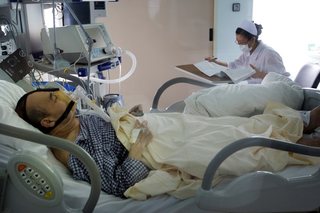Between 600-800 thousand illegal immigrants currently living in Moscow
Published:
29 June 2001 y., Friday
At a news conference on Thursday, Moscow’s vice mayor Valery Shantsev and the chairman of the capital city’s committee for migration affaires Sergei Smidovich announced that between 600-800 thousand illegal immigrants currently living in Moscow. The number of foreigners who live and wok in Moscow on a legitimate basis amounts to 62 thousand, whereas the black market of foreign labour, according to the estimations of the city authorities, is twice as large.
In the year 2000 inspections were conducted in 513 firms and enterprises in order to uncover illegal employment use of foreign labour. 9.5 million rubles of fines were collected from employers caught using foreign labour.This year 469 firms have already been inspected, 187 offenders were detected and over 5 million rubles collected.
The vice mayor of Moscow Valery Shantsev also said that “Moscow has gained the status as a transit point for illegal migrants bound for the USA, Canada and other countries”.
Given the transparency of the city’s boundaries and absence of the effective migration regulations, the city authorities are forced to handle the problem on their own, the vice mayor stated.
Shantsev said that to resolve that issue it would be necessary to pass new laws on the federal level. In particular, a law on the abode of foreigners in Russia is needed.
The vice mayor also said that in the near future will be signed an agreement on cooperation between the Ministry for Federal Affaires, the Ministry for National and Migration Policy and the Moscow City Migration Committee. The agreement will provide for the delimitation of jurisdiction between the federal and municipal agencies in the sphere of migration issues, the vice mayor said.
Šaltinis:
gazeta.ru
Copying, publishing, announcing any information from the News.lt portal without written permission of News.lt editorial office is prohibited.
The most popular articles
 51-year-old mother of eight, sits beside her sick husband, Tuy Muy, 52, in Battambang Provincial Referral Hospital. He is lying on a bed with a stomach problem, battling nausea and vomiting.
more »
51-year-old mother of eight, sits beside her sick husband, Tuy Muy, 52, in Battambang Provincial Referral Hospital. He is lying on a bed with a stomach problem, battling nausea and vomiting.
more »
 The length of maternity and paternity leave are at the heart of a crucial vote in the plenary sitting of March 24-25.
more »
The length of maternity and paternity leave are at the heart of a crucial vote in the plenary sitting of March 24-25.
more »
 The perception women have of the EU, the way the economic and financial crisis is affecting women and the lessons to be learnt ahead of the 2014 elections are among the issues to be tackled during a colloquium being held at the European Parliament on Tuesday.
more »
The perception women have of the EU, the way the economic and financial crisis is affecting women and the lessons to be learnt ahead of the 2014 elections are among the issues to be tackled during a colloquium being held at the European Parliament on Tuesday.
more »
 To achieve quicker de facto gender equality, Commission and Member States should adopt and implement specific gender equality policies, Parliament said in a resolution adopted on Thursday.
more »
To achieve quicker de facto gender equality, Commission and Member States should adopt and implement specific gender equality policies, Parliament said in a resolution adopted on Thursday.
more »
 Are you thinking about setting up your own business or are you already a successful entrepreneur? The Erasmus for Young Entrepreneurs exchange scheme offers an excellent opportunity for new entrepreneurs to acquire relevant skills for managing a small or medium-sized enterprise (SME).
more »
Are you thinking about setting up your own business or are you already a successful entrepreneur? The Erasmus for Young Entrepreneurs exchange scheme offers an excellent opportunity for new entrepreneurs to acquire relevant skills for managing a small or medium-sized enterprise (SME).
more »
 The pain of divorce and separation is all too often accompanied by financial and emotional hardship when one parent lives abroad and refuses to provide financial help.
more »
The pain of divorce and separation is all too often accompanied by financial and emotional hardship when one parent lives abroad and refuses to provide financial help.
more »
 Most Europeans still do not know they can call 112 anywhere in the EU to contact the police, fire brigade or an ambulance.
more »
Most Europeans still do not know they can call 112 anywhere in the EU to contact the police, fire brigade or an ambulance.
more »
 Helping to meet Haiti's humanitarian, reconstruction and nation-building needs must be the EU's priority in tackling the earthquake's aftermath, says Parliament in a resolution approved on Wednesday.
more »
Helping to meet Haiti's humanitarian, reconstruction and nation-building needs must be the EU's priority in tackling the earthquake's aftermath, says Parliament in a resolution approved on Wednesday.
more »
 Further work is needed to continue improving access to safe drinking-water at home, sewerage systems and safe bathing water throughout the European Region.
more »
Further work is needed to continue improving access to safe drinking-water at home, sewerage systems and safe bathing water throughout the European Region.
more »
 Poor housing remains a blight across Europe and Tuesday evening MEPs will debate a plan to extend EU funding to help renovate and repair housing stock for the poorest people on the continent.
more »
Poor housing remains a blight across Europe and Tuesday evening MEPs will debate a plan to extend EU funding to help renovate and repair housing stock for the poorest people on the continent.
more »